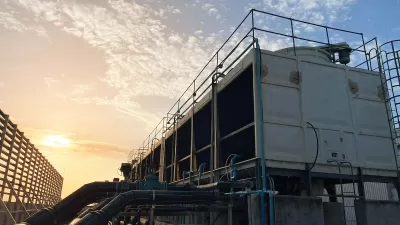The state legislature is poised to pass a law that would bring more data centers to the state, but critics say the move would threaten the state’s climate goals.

Critics of a proposed Michigan state bill aimed at attracting energy-guzzling data centers to the state say it amounts to the state backtracking on its climate and decarbonization goals.
As Tom Perkins explains in The Guardian, the massive energy draw required by data centers would likely trigger an “offramp” clause in climate legislation passed last year that would allow fossil fuel-powered plants to continue operating. “That would put an end to Michigan’s climate legislation that requires 100% renewable energy by 2040, and dramatically increase electric rates for residential customers, critics say.” In addition to electricity, data centers also consume massive amounts of water, up to 5 million gallons daily for evaporative cooling systems that critics say could be replaced with more efficient methods.
“Michigan isn’t alone, as data centers are quickly emerging as a serious threat to the nation’s climate goals. Tech companies use them to store servers and networking equipment that process the world’s digital traffic, and artificial intelligence is driving a boom,” Perkins adds. While some cities and states are wooing the companies for economic development, other places are considering bans in highly walkable commercial areas such as Atlanta’s Beltline.
FULL STORY: In threat to climate safety, Michigan to woo tech data centers with new laws

Planetizen Federal Action Tracker
A weekly monitor of how Trump’s orders and actions are impacting planners and planning in America.

Congressman Proposes Bill to Rename DC Metro “Trump Train”
The Make Autorail Great Again Act would withhold federal funding to the system until the Washington Metropolitan Area Transit Authority (WMATA), rebrands as the Washington Metropolitan Authority for Greater Access (WMAGA).

The Simple Legislative Tool Transforming Vacant Downtowns
In California, Michigan and Georgia, an easy win is bringing dollars — and delight — back to city centers.

Albuquerque’s Microtransit: A Planner’s Answer to Food Access Gaps
New microtransit vans in Albuquerque aim to close food access gaps by linking low-income areas to grocery stores, cutting travel times by 30 percent and offering planners a scalable model for equity-focused transit.

This City Will Pay You to Meet Your Neighbors
A North Kansas City grant program offers up to $400 for residents to throw neighborhood block parties.

Commentary: Our Silence Will Not Protect Us
Keeping our heads down and our language inoffensive is not the right response to the times we’re in. Solidarity and courage is.
Urban Design for Planners 1: Software Tools
This six-course series explores essential urban design concepts using open source software and equips planners with the tools they need to participate fully in the urban design process.
Planning for Universal Design
Learn the tools for implementing Universal Design in planning regulations.
Smith Gee Studio
City of Charlotte
City of Camden Redevelopment Agency
City of Astoria
Transportation Research & Education Center (TREC) at Portland State University
US High Speed Rail Association
City of Camden Redevelopment Agency
Municipality of Princeton (NJ)





























